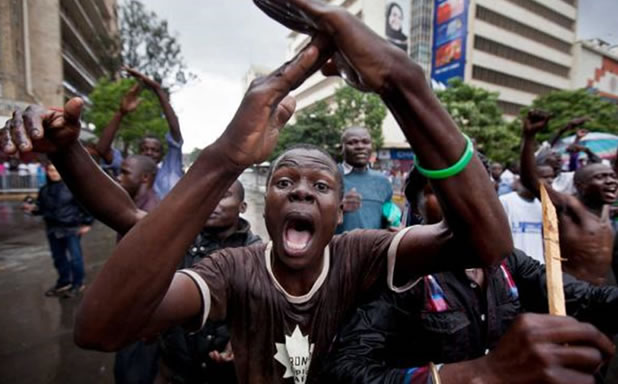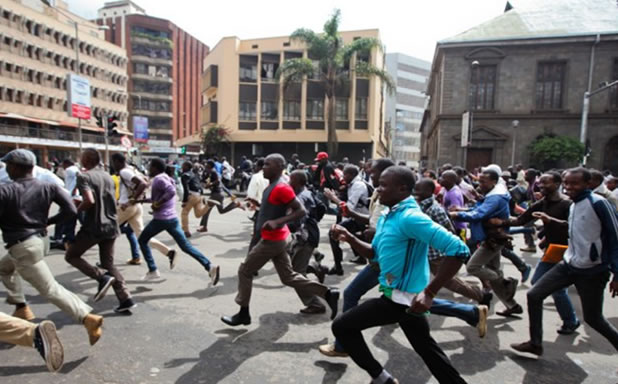Mar. 2008: “Leave bad things, talk peace.” – Sheng (Kenya) Sayings
Leave bad things, talk peace.
Dere amani manzee. (Sheng)
Drive peace my colleagues.

Sheng (Kenya) Sayings
Background, Explanation, Meaning and Everyday Use
Our research in Nairobi, Kenya during the months of January and February, 2008 uncovered these 40 sayings and slogans on peace, peacemaking, reconciliation and justice. These messages are listed in English in alphabetical order together with the Sheng and Swahili translations where used and available.
Choose Peace for Kenya (Chagua Amani Kenya)
Choose Peace, Prevent Bad Situations (Chagua Amani, Zuia Noma).
Drive peace my colleagues (Dere amani manzee).
Extend an olive branch to your neighbor, Symbol of Peace.
Help save Kenya.
I am a Christian first, a Kenyan second and a Kikuyu third.
I am KENYAN. I want PEACE. Let’s WALK the TALK.
If Annan can’t resolve our political crisis, we should be prepared for anything.
I’m 4 peace.
I spit out bad things, I welcome peace (Noma naitema, amani naikaribisha).
I support Peace in Kenya
Justice 4 Kenya.
Keep peace.
Kenya — Our Unity Is Our Pride.
Lay down your pangas, arrows, rungus, guns.
Leave bad things, talk peace (Wacha noma, bonga amani).
Let peace fill our heart, our world, our universe.
Let peace prevail.
Let’s emphasize peace, let’s satisfy God (Tuzingatie amani, tumridhishe Mungu).
Let’s unite.
Make Me an Instrument of Peace in Kenya.
May peace rule over Kenya. And this peace should begin with me (Amani itawale Kenya. Na amani hiyo ianzie kwangu).
Mothers, Daughters, Sisters, Wives: Help to Stop the Violence. Promote Peace Through Forgiveness and Reconciliation.
Through young people a march to freedom has started. It is a march without violence.
One people. One nation. Choose peace.
Our beloved country. Let Kenya be for ALL.
Peace. Love. Unity. Now’s the time.
Peace — Wanted Alive.
People for Peace in Kenya. Promote Change Through Active Non-Violence.
Resettle ALL IDPs.
Say NO to Corruption.
Say “No” to Violence. Say “Yes” to Peace.
Stand Up for Safer Neighborhoods.
Support peace. Cool down. (Weka amani. Poa).
Use your freedom to express yourself in a non-violent way.
We are for peace.
We are Kenyans. Why fight
We Kenyans have the terrible disease of tribalism.
We Want Our Country Back
Some of these sayings and slogans are religious, others advocacy, others political, others humanitarian and others cultural. These sayings and slogans were found on/in:
Announcements on radio and TV
Banners
Bumper stickers on vehicles
Billboards
Bottom of email messages
Everyday conversion
Graffiti written on walls, gates, rocks, large stones, etc.
Meetings
Newspapers and magazines
Poems
Popular songs
Postcards
Posters
Prayer services
Sermons
Signs on public buses called matatu
Stickers
Talks
Text messages on cellphones
T Shirts
We have chosen two popular Sheng sayings used by the youth in Nairobi to represent the whole genre.
Wacha noma, bonga amani. (Sheng)
Leave bad things, talk peace.
Noma is a popular Sheng word that rhymes with homa, the Swahili word for “fever” or “malaria.” The advanced stage of cerebral malaria is a very bad thing and can cause a person to go crazy and do crazy things. Bonga means to “talk” or “speak.”
Dere amani manzee. (Sheng)
Drive peace my colleagues.
Dere means “to drive” or a “driver” and manzee means a “colleague” or “colleagues.”
For Kenyan youth the word “colleague” means a person with whom you share common values towards issues on the ground or common views on certain situations. For now, the colleagues are holding common views on peace, constitutional change, shared resources, security for all, gender and opportunities for youths. This Sheng saying also proclaims peace.
NOTE: The youth subculture in Nairobi, Kenya coined Sheng as a common language of interaction among them. The word Sheng has it origins in the 1970s to capture the then new youth language of Nairobi and picked up momentum in the 1980s and 1990s. It is a blend of Swahili, English and other local Kenyan languages such as Gikuyu, Dholuo, Kamba, etc. It is the short form of Swahili and English, hence Sheng. Later it incorporated other local languages, but the name of the new blend remained the same. The Swahili part of the formation of the word is at the front meaning that Swahili contributed more words and phrases in the new language. It is thought to have originated in the Eastlands Estate in Nairobi. Later in the 1990s the youth from the middle class estates of Nairobi used a different form of this language with English contributing more words and phrases so this form was given the name Eng-ish. However this form did not catch on and was “eaten” by the Eastlands Sheng that is the form that was commonly used and that spread to Kenya’s main cities and towns.
This unique language has been attributed to the language complexity in Kenyan cities that attracts a wide variety of languages. It has also been seen as the youth’s attempt to carve out a niche for themselves, to give themselves a special identity and communication style, and to mark out how distinct they are from the older generation of their parents. Their parents try to solve practical issues by tracing them back to their ancestral homes and customs especially in rural areas (referred to as “upcountry”). For the youth this was a waste of time. Especially for those youth born and raised in Nairobi they are city people, they are urban dwellers. They admire and like this new cosmopolitan world. They have no connection to their ancestral homes especially in rural areas. So Sheng is their own “in” language of the city. It unites the youth in the city.
In the emotional realm of ethnicity (negatively called “tribalism”) in Kenya today, the Sheng language is seen as one of the answers to the negative notions of ethnicity in urban areas given that no one ethnic group (and its specific language) is able to solely identify with the Sheng language. It is a composite of many languages.
In addition, in the past few months the youth in Nairobi have coined slogans such as
I’m 4 peace and Justice 4 Kenya that use their shorthand codes in text messaging.
 Biblical Parallels
Biblical Parallels
“Blessed are the peacemakers, for they will be called children of God” (Matthew 5: 9).
“Jesus himself stood among them and said to them, “Peace be with you” (Luke 24:36).
“Now I appeal to you, brothers and sisters, by the name of our Lord Jesus Christ, that all of you be in agreement and that there be no divisions among you, but that you be united in the same mind and the same purpose” (1 Corinthians 1:10). Used in Cardinal John Njue, the Catholic Archbishop of Nairobi, Kenya’s Pastoral Letter entitled Be Reconciled to God; Now is the Favorable Time (2 Corinthians 6:2) in Lent, 2008.
“I have set before you life and death, blessings and curses. Choose life so that you and your descendants may live” (Deuteronomy 30:19).
Contemporary Use and Religious Application
After the national elections in Kenya on 27 December, 2007 there was a lot of discontent and accusations of widespread vote rigging. This led to riots, violence, killings, burning of homes and shops and displacement of people throughout the country. By the end of February, 2008 over 1,000 people have been killed and over 500,000 people made homeless. In the midst of these political and ethnic group (tribalism) crises various peace campaigns emerged with appropriate messages, sayings and slogans. This shows the influence of oral culture in our contemporary African society.
While African youth know fewer and fewer traditional proverbs, the use of popular sayings and slogans is increasing especially in cities. The youth are now using these sayings and slogans to promote harmony and reconciliation among different ethnic groups in Kenya. They are involved more and more in peacemaking and reconciliation activities in Kenya through using their street language of Sheng and other slogans. The youth are encouraged to participate in such campaigns as the Kenya Lenten Campaign 2008 (Kenyan Catholic Justice and Peace Commission) on the theme: “With a New Heart and a New Spirit.” The specific focus of Week Two of the campaign was “Youth Empowerment.” Many activities have taken place throughout Kenya such as the Kenyan National Youth Violence Prevention Week, the Youth Peace Week, the Peace Caravan and the Peace Run.
An article was published in the 9 March, 2008 issue of the Sunday Times ( Kenya ) called “Of the Youth and Normalcy in Kenya ” by Francis Njuguna, a Kenyan freelance journalist. It describes the recent research survey on youth sayings and slogans on peacemaking and reconciliation. It can be found online at: http://www.kenyatimesonline.com/content.asp?catid=9&articleId=1683
A “Cover” Story was published in the 10 March, 2008 issue of America Magazine (USA) called “A Tale of Two Elephants: Overcoming the Postelection Crisis in Kenya ” by Agbonkhianmeghe E. Orobator. The author is a Nigerian Jesuit priest who has contributed to this website. He uses the famous (and very popular) African saying to characterize the current postelection crisis in Kenya : When two elephants fight, the grass suffers. What is particularly original is how he applies the saying eight times to President Mwai Kibaki and Raila Odinga who may become the new Prime Minister and to the local situation here in Kenya in the article. It can be found online at: http://www.americamagazine.org/conte…ticle_id=10670
NOTE: A search for “Peace” on this website resulted in 54 matches. In addition many African proverbs are found on the “Message Board” especially in the forum “Using African Proverbs in Daily Life.” Go to: http://forum.afriprov.org/msgboard
Mr. Francis Osman Njuguna
Nairobi, Kenya
Email: osnjuguna@yahoo.com
Cellphone: 0720-434819
Mr. Evans K. Nyakundi
Hekima College Library
Nairobi, Kenya
Email: evansnyakundi@yahoo.com
Cellphone: 0722-566445
Rev. Joseph G. Healey, M.M.
Maryknoll Society
P.O. Box 43058
00100 Nairobi, Kenya
Email: JGHealey@aol.com
